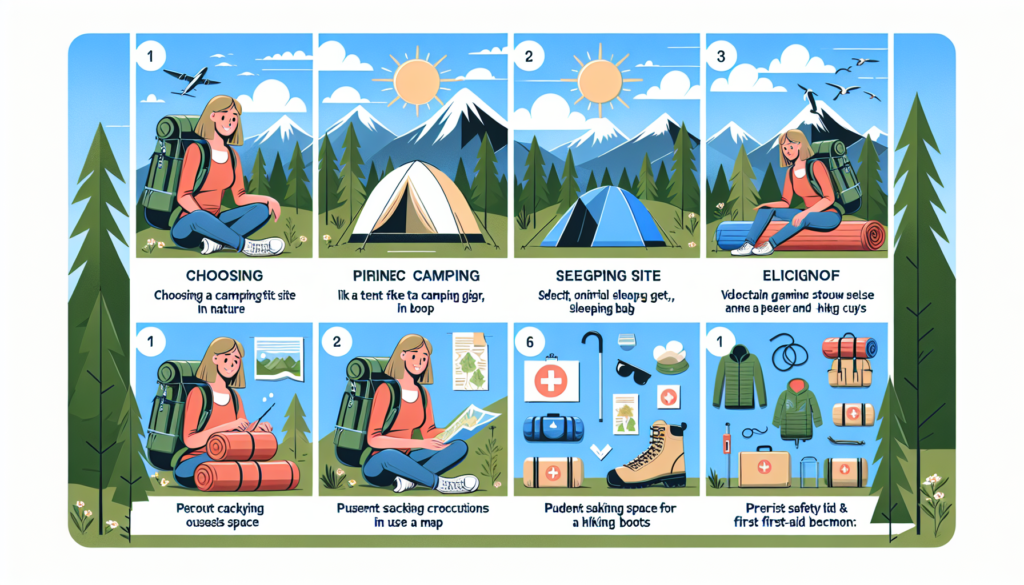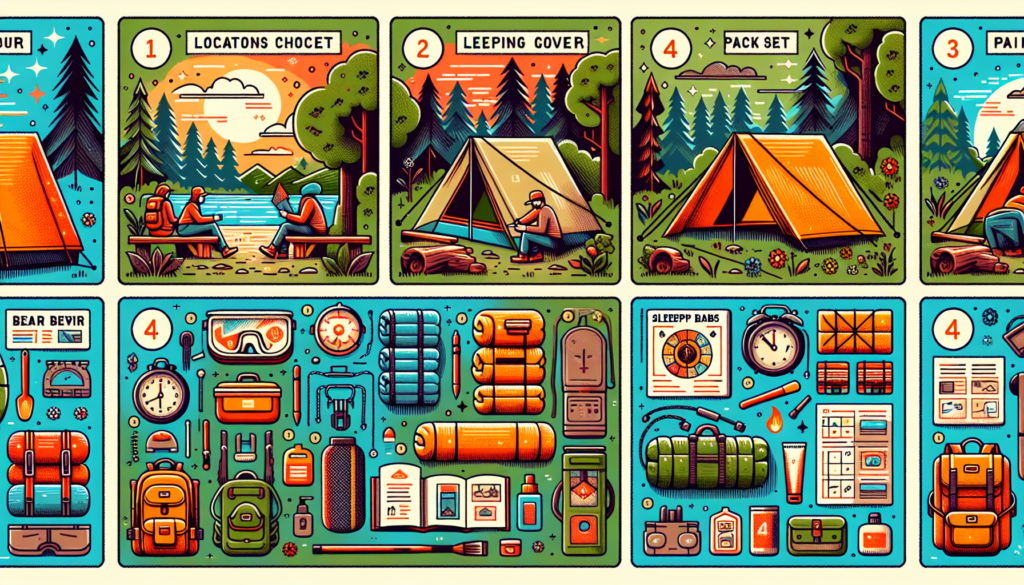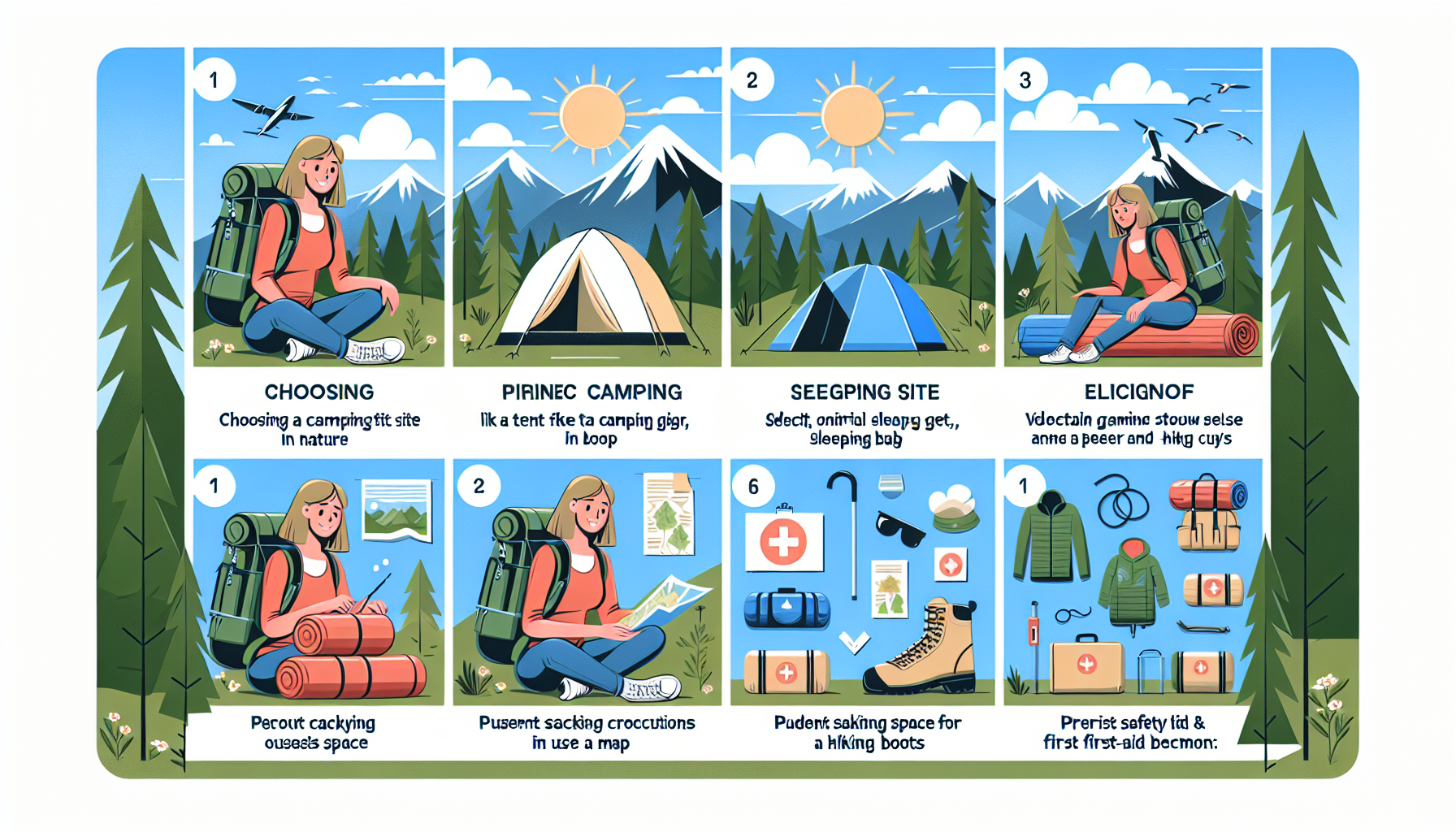So, you’ve decided to embark on a thrilling adventure into the great outdoors and plan your very first camping trip. But where do you even begin? Don’t worry, because in this beginner’s guide, we’ve got you covered. From choosing the perfect location and gathering essential gear to planning exciting activities and meal ideas, we’ll take you through all the steps to ensure that your camping trip is nothing short of unforgettable. So grab your compass, put on your hiking boots, and let’s dive into the exciting world of planning a camping trip for beginners!

Choosing a Destination
When planning your first camping trip, choosing the right destination is essential. Start by considering the season and weather conditions. Determine whether you prefer a warm summer camping experience or a cozy winter adventure. Research local campgrounds in the area you wish to visit. Look for campgrounds that suit your preferences, whether you prefer a secluded and peaceful spot or a campground with more amenities. Additionally, check if any permits or reservations are required for your intended destination.
Packing Essentials
Packing the right gear and equipment is crucial for a successful camping trip. Make sure to pack a sturdy tent and appropriate sleeping gear for a comfortable night’s sleep. Don’t forget to pack appropriate clothing and footwear to match the weather conditions and activities you plan to engage in. Consider the meals you’ll be preparing and pack essential cooking equipment and food accordingly. It’s also important to have a well-stocked first aid kit and any necessary medications. Additionally, don’t forget navigation tools and maps, lighting and fire-starting supplies, as well as personal hygiene items and toiletries.
Preparing Camping Meals
Planning meals in advance is key to ensuring you have enough food for your camping trip. Consider any dietary restrictions or preferences when selecting meals. Opt for easy-to-cook and packable food options that don’t require too much preparation. Don’t forget to pack essential cooking equipment such as a camping stove, pots, pans, and utensils. It’s also crucial to practice safe food storage and handling to prevent any issues with foodborne illnesses.
Setting Up Camp
Choosing a suitable campsite is essential for a comfortable camping experience. Look for a level and dry area away from potential hazards, such as dead trees or steep slopes. Once you’ve found the perfect spot, proceed with pitching your tent. Familiarize yourself with the instructions and take your time to ensure a secure setup. Setting up sleeping arrangements involves inflating sleeping pads or air mattresses and arranging sleeping bags or blankets for a restful night’s sleep. Lastly, focus on creating a comfortable and organized campsite by arranging your gear and supplies in an easily accessible manner.

Campfire Safety
Before starting a campfire, it’s important to check local fire regulations and restrictions. Make sure campfires are permitted and follow any guidelines in place. When building a fire pit, opt for a safe and contained structure to prevent the spread of flames. Always keep a bucket of water or sand nearby to extinguish the fire in case of an emergency. Prior to leaving the campsite or going to sleep, ensure the fire is completely extinguished by dousing it with water and stirring the ashes until cold to the touch.
Exploring Outdoor Activities
Camping offers a multitude of opportunities for outdoor activities. Hiking and backpacking are popular options, so make sure to research and choose a trail suitable for your fitness level and preferences. If you enjoy fishing, seek out campgrounds near bodies of water where you can cast your line. Engaging in water activities like swimming, kayaking, or canoeing can also be a great way to cool off and have fun. Wildlife spotting and birdwatching are fantastic ways to connect with nature, and don’t forget to bring along binoculars. Nature photography and stargazing are also excellent activities to enjoy the beauty of the natural surroundings. Finally, take the opportunity to learn about the local flora and fauna by identifying plants and animals in the area.
Ensuring Safety in the Wilderness
While camping is a wonderful adventure, it’s important to prioritize safety. Be aware of potential hazards and risks in the wilderness, such as uneven terrain or wildlife encounters. Pack necessary safety equipment, including a flashlight, whistle, and a basic first aid kit. Stay hydrated to prevent dehydration, and protect yourself against the sun by applying sunscreen and wearing appropriate clothing and a hat. To prevent encounters with wildlife, store food securely and dispose of waste properly. It’s also beneficial to familiarize yourself with basic first aid and emergency procedures before your camping trip.
Leave No Trace Principles
When camping, it’s crucial to follow the principles of Leave No Trace to minimize your impact on the environment. Dispose of waste properly by packing out all trash and using designated waste disposal facilities. Minimize campfire impacts by using established fire pits and only burning small, manageable fires. Show respect for wildlife and their habitats by observing them from a distance and not feeding or disturbing them. Leave natural and cultural artifacts undisturbed, preserving them for others to enjoy.
Dealing with Outdoor Challenges
Camping often presents challenges that can be overcome with preparation and knowledge. Inclement weather can be managed by packing appropriate clothing and gear. Navigating unfamiliar trails and terrain is easier with the use of maps, a compass, or a GPS device. Address common camping dilemmas such as tent leaks or sleeping discomfort by being prepared with repair kits or alternative gear. Finally, coping with insects and pests can be tackled by using insect repellent, wearing protective clothing, and sealing food in secure containers.
Camping Etiquette
Respecting your fellow campers and the campground rules is essential for a harmonious camping experience. Observe quiet hours and be mindful of noise levels to ensure everyone can enjoy a peaceful night’s sleep. Avoid excessive noise and disruptive behavior that may disturb others. Familiarize yourself with campground rules and regulations and abide by them to maintain a safe and clean environment for everyone. Lastly, practice good campsite hygiene by properly disposing of garbage, keeping cooking areas clean, and properly disposing of waste water to prevent contamination.
In conclusion, planning a camping trip for beginners involves careful consideration of the destination, packing essential items, preparing meals, setting up camp, prioritizing safety, practicing Leave No Trace principles, dealing with outdoor challenges, and following camping etiquette. By following these guidelines, you can embark on a memorable and enjoyable camping adventure that will create lasting memories in the great outdoors. Happy camping!
